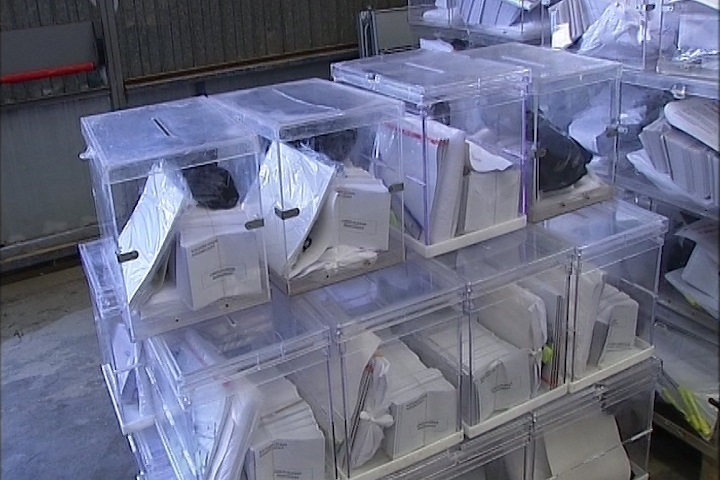12.05.2017 - 12:14
|
Actualització: 16.05.2017 - 16:13
On Tuesday, the Catalan government triggered the procedure to purchase eight thousand ballot boxes. The Official Gazette of the Government of Catalonia (DOGC) announced the tender to make the boxes for an approximate value of two hundred thousand euros, giving all companies wishing to take part two weeks to make their bids. One step ahead of this situation, the Spanish government has threatened the companies willing to participate in a tender of this kind, but, in fact, the government has announced the tender stipulating that it fulfils Spanish and Catalan electoral legislation and at no time mentions the use of these ballot boxes in a future referendum.
Sources from the Presidency Department of the Government of Catalonia explained to this newspaper that everything was being done according to law, leaving no possible legal argument against the Catalan Government buying ballot boxes to hold elections. It is a known fact that there are more autonomic administrations that have their own boxes to hold elections and consultations whenever they require; the basic question in this case is whether the government intends to avoid the legal siege with all of its final consequences, or whether it is willing to forego the legal threat at any particular time. The answer given to this newspaper is that the referendum will be held and the citizens will be able to vote, because this is what the government has committed itself to.
The idea of the Catalan Government
The Catalan government wants all the questions affecting private participation resolved by the time the referendum is called. When it is, and the expected challenge comes from the Spanish Constitutional Court (CC), the Catalan government wants all contracting to be complete and the work to have been done. The aim is that it should be the Catalan government that receives the full brunt of the Spanish legal action and that there should be no shortcomings due to companies’ fear of supplying the material and services necessary for voting.
The Catalan government particularly seeks discussion with the Spanish state in defence of the ballot boxes and of Catalonia voting against their prohibition. According to the consulted sources, this will allow the government to take all possible steps to ensure that the referendum is held and is binding, because there will be a firm will to apply the result.
A legal purchase, but…
Although the purchase of ballot boxes is legally covered by the Organic Law of the Spanish electoral system and by Catalan law, the Higher Public Prosecution of Catalonia is already preparing a plaint to oppose the move, according to reports on Tuesday. It is not yet known what crimes the prosecution will allege and how the purchase of ballot boxes, in which there is no talk of the referendum, will be related to the CC’s suspension of the referendum last December.
‘In such cases, I never make theories on the ways others might possibly act for obvious reasons, but action is possible’, says the professor in criminal law of the University of Barcelona Joan Queralt, who tells VilaWeb that he can see no way that the CC suspension can be related to the ballot boxes. He also believes that their purchase is absolutely legal. ‘All autonomous communities have purchased ballot boxes and the Spanish government has too. Ballot boxes are not material with a restricted use, nor are they technological or strategic, so this is free trade.’
Regarding the Spanish government’s threats aimed at companies supplying the ballot boxes, Queralt is clear. ‘There is no crime of any kind.’ The lawyer Josep Costa says the same, but suspects that the prosecution might turn the companies into co-participants of a crime of misuse of funds of which the government is accused, as well as abuse of power. ‘It is ridiculous, but nothing is impossible in this country. Remember they have already condemned the President of the Government of Catalonia and three ministers for something that the Spanish Prime Minister and the Minister of Justice defined as a triviality’, says Queralt.
‘We will go in for the tender, we are not frightened’
With the tender to buy ballot boxes posted in the DOGC, in the public’s eyes the Catalan government has formally activated the organisation of the referendum in September. The tender is for two items: one purchase of 8,000 transparent ballot boxes and another of 4,000 in cardboard, and companies interested have been given two weeks to answer.
VilaWeb has contacted two companies specialising in plastics and methacrylate that might offer to make the ballot boxes. The Barcelona company Plastic Express says that it will ignore the Spanish government’s threat to go after companies answering the tender. Andreu Marquès, project technician of Plastic Express, explains: ‘We will go in for it, we are not frightened. What fear should we have of working? We work and if we get the job, it will be a good order for a good customer, in this case the Government of Catalonia.’ And he adds, ‘we do not know what they will do with the ballot boxes, whether they will make castles, whether they will use them to vote or to make a wall.’
Now the companies have two weeks to present their candidatures, but it is not yet known when the manufactured ballot boxes will have to be delivered. This is something that will be pinned down after the adjudication, and the place of delivery too, but it will be ‘a single place in a metropolitan area of Barcelona’, according to the technical conditions of the framework agreement.
The position of Metacrilat.com, a company from Olot (Garrotxa) which, as the name indicates, specialises in handling methacrylate, is very different. The director, Lluís Clavaguera, says that his company will not take part in the tender because he mistrusts the threats from the Spanish government. ‘I don’t how this will end up. You get involved and in the end who does it… I am worried because the next day you might get a tax inspection.’ Claveguera says it is not fear, but rather respect, that he feels for the threats.
He also says that he works with methacrylate and seriously doubts whether the ballot boxes will end up being made in this material. ‘Given the maximum price established by the Generalitat government, 25 euros per box, in the end I think it will be done by company specialising in plastic injection. Maybe some part will be in methacrylate, but at this price, they will have to contain plastic.’ He also believes that the successful bidder will be a foreign company with greater capacity to reduce costs. ‘They will end up coming from China’.
Marquès, of Plastic Express, also says that the ballot boxes will not be made in methacrylate, as was recently published. ‘Everyone talks about methacrylate, but if this were the case, they would break very quickly. The Catalan government does not specify what material has to be used, only that the boxes have to be transparent. We would use a material that is used to make all of the ballot boxes in the world, which is a kind of plastic.’
And the voting slips?
The dust cloud of the purchase of the ballot boxes could be raised again when the Catalan government calls for the purchase of the voting slips. This will come later, when they are needed, but the Catalan government has already identified the candidates; these are Formsystem Documentos Inteligentes (of Madrid), Tompla Industria Internacional del Sobre (of Alcalá de Henares), Impresiones Transkrit (of San Sebastian) and Domènech Mirabet (of l’Hospitalet de Llobregat).
The choice came in an agreement in early April. ‘The aim is to select the companies that could supply the necessary electoral material for elections to the Parliament of Catalonia and to establish the requirements and conditions to which derived contracts will be subject during the period of enforcement’.
The tender has a budget of 641,000 euros and an estimated contract value of 897,000 euros. The adjudication has not yet been made, but the process of approving companies to make electoral material is under way.
The ballot boxes, the voting slips and the envelopes are some of the materials essential for voting on independence. The Catalan government will have to contract computer services to develop the applications and the publication websites to allow the counting and the voting procedure. The transportation of the material and its later destruction will also have to be contracted. In the judicial process against the 9-N consultation, the Superior Court of Justice and the Supreme Court used all of these services to argue a crime of disobedience following the ruling of the CC of 4 November 2014. This time, the Catalan government will ensure that the referendum is held officially and with full institutional support and involvement. Volunteers will not be used as with the 9-N, and the present concern is to avoid the pressure and threats from the Spanish government having any effect on the contracted companies.




